Papers by Dr. Francis Onditi
Cogent social sciences, May 31, 2024
Reimagining Security Communities, 2021
Reimagining Security Communities, 2021
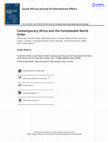
South African Journal of International Affairs, 2020
Contemporary Africa and the Foreseeable World Order is situated in the growing discourse surround... more Contemporary Africa and the Foreseeable World Order is situated in the growing discourse surrounding Africa's agency and pursuit of a central role in the international milieu. Its purpose, according to the introduction, is to highlight the importance of examining emerging African regimes, institutions, norms and values to address the infiltration of 'African regimes' by developed countries (p. 3). The first of the volume's three sections-'African states and actions towards a normative agenda'begins with several chapters providing a historical overview of the continent's role in international affairs. Thereafter, it considers Africa's emerging peace and security agenda, African Union (AU) financing, the role of the AU in conflict prevention, and African values as they relate to refugees. Across this analysis, contributors highlight the role of pan-Africanism in shaping perspectives and norms across the continent, while also acknowledging that, in practice, Africa's approaches continue to be underpinned by dominant international paradigms. As Cheryl Hendricks argues, there is 'a contradictory methodology in which they assert the principles of Pan-Africanism, yet the practice has been that of neoliberalism' (p. 72). This challenge of dependence on existing norms is further highlighted by Kasaija Apuuli in his assessment of Africa's efforts to adopt new approaches to funding mechanisms. Chapter 5 assesses developments in AU norms and approaches to conflict prevention. Adriana Erthal Abdenur and Giovanna Kuele highlight the progressive developments of the AU in shaping dispute resolution, including the creation of a Mediation Support Unit and the 'strong effort to increase meaningful participation of women in mediation' (p. 103). Following from this, Gilan Ben-Nun addresses 'heroic hospitality' to refugees across the continent. He points out that 'one is hard-pressed to deny the simple fact that African societies tend to be unequivocally more hospitable, especially to the migrant stranger, than occidental ones' (p. 117). While Ben-Nun provides an interesting longitudinal analysis of Morocco and Ethiopia, it would have been interesting to delve further into why some countries (Kenya and South Africa, for example) have become less than hospitable towards migrants and refugees. Part 2 collates diverse chapters under the broad theme, 'Geo-politics and globalism'. Chapter 8 assesses the 'democratic regression' (p. 155) across central Africa (Angola, the Republic of Congo, Democratic Republic of Congo, Rwanda and Burundi), linked to the idea of constitutionalism. Given the focus on norms and constitutionalism, this analysis may have been more suited to inclusion in Part 1. Chapter 9's focus on Sino-Zimbabwean relations is more clearly rooted in geopolitics and the structural challenges facing African countries in global politics. Aside from this chapter, the predominant focus of Part 2 is geopolitics within the continent (intra-Africa or regional). This includes consideration of the AU's African Standby Force, the balance of power in the AU Commission's 2017 elections, and the hydropolitics of East Africa. The Nile river and the region's lakes are used to demonstrate 'the existence of a resource race that facilitates the emergence of strategic local and national hegemons on shared water bodies' (p. 230).
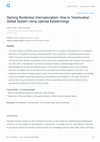
This article develops a proposed unifying theoretical framework for the concept of ' interlocalis... more This article develops a proposed unifying theoretical framework for the concept of ' interlocalisation' as an explanatory adjustment to the hegemonic concept of internationalization. This is a response to an exploratory study by Francis Onditi, 'Futuring an 'Inclusive Knowledge Futures' framework beyond IR theories', aimed at elucidating Afrocentric international studies scholars' understanding of Africa's futures that emboldens both local and global value systems. In the current article, 'interlocalisation' is defined as a process of creating a seamless linkage between local epistemologies and international knowledge systems. In this system of knowledge production and consumption, institutions and debates shift from the national scale to the global scale and downwards to the local level. In this proliferation and restless knowledge scaling it remains blurred whether the local African epistemologies and knowledge networks are capable of becoming simultaneously more globalised and transnational. In this article, we utilize the gaming model to pay more attention to the politics of African epistemology (Ujamaa) and its implication on this geographical reconfiguration of the international system.
African Conflict and Peacebuilding Review, Dec 1, 2021

African Geographical Review, Jun 16, 2016
In this paper, we have examined gender equality and women’s empowerment (GEWE) as reflected in th... more In this paper, we have examined gender equality and women’s empowerment (GEWE) as reflected in the millennium development goals (MDGs) as well as the conceptualization and localization of the sustainable development goals (SDGs). The paper adopts Amartya Sen’s women agency conceptual framework to advance the thesis of this article that while there is general consensus on achieving gender equality and women’s empowerment, the MDGs adopted in 2001 fell far short of fulfilling this consensus and that the incoming SDGs must respond to fundamental issues of GEWE from both quantitative and qualitative perspectives. This paper addresses the issues of conceptualization, context, and design of MDGs and how lessons learnt in its implementation inform SDGs. The question is, will GEWE maintain any pride of place? Analysis in the paper reveals that qualitative indicators such as human rights, equity, and capabilities were silent in the MDG design, constructs, and implementation. The paper suggests that the understanding and putting in place of mechanisms for continuous assessment of the human-centered indicators, such as quality of life, as part of the SDGs’ localization efforts portend increasing effectiveness of SDGs toward addressing gender-sensitive issues of social exclusion, inequality, and resource distribution, which have a great bearing on sustainable development.

This chapter introduces the concept of women born equal and its theoretical foundation in social ... more This chapter introduces the concept of women born equal and its theoretical foundation in social change. The chapter acknowledges the development of United Nations Security Council Resolution 1325 within the global framework of Women, Peace and Security (WPS). The WPS framework is anchored in five tenets: (1) increased participation and representation of women at all levels of decision-making; (2) attention to specific protection needs of women and girls in conflict; (3) a gender perspective in post-conflict processes; (4) a gender perspective in UN programming and reporting, and in SC missions; and (5) gender perspectives and training in UN peace support operations. These tenets are reinforced by the three pillars (popularly known as the “3Ps”); protection, prevention and participation. Together with relief and recovery, the three pillars form the basis of analysis throughout this volume.
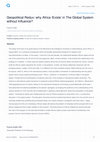
This essay forms part of my guest lecture to be delivered at the prestigious University of Johann... more This essay forms part of my guest lecture to be delivered at the prestigious University of Johannesburg, South Africa, in August 2023. It is a scholarly arrangement within the broader partnership framework for research and internationalization of ideas. In this essay, I note that in the last decade, the relationship between African states and the rest of the world led by the US and China has burgeoned, albeit, remains skewed. I have likened this relationship to the analogy of a "butterfly", in which case the western powers (led by the US and her allies) are akinto the "thorax" (center), while the African states represents the "wings" in the periphery. Further, the African diplomatic interaction with the emerging powers, notably, China and India, is no different from that of western powers. Before delving into the core of the lecture-which is, Africa in the international system, I have provided a framework of understanding how the global system works using a political philosophy prism. That is, 'existence'/ or'inexistence' of African states in the global system. Closely tied to the philosophy of existence and truth, is the analysis of international system dynamism. The science of international system dynamism is explained using the British political geographer-Sir Halford J. Mackinder's 1904 geographical pivot of history. Based on this theoretical framework and thinking of post-Mackinder world order, I have debunked the falsehood peddled by the western apologists, by bringing the audience to the understanding of the various versions of 'truth' and the role of intellectuals in rejecting a decorated ' truth' about the composition of the global system. I conclude by calling upon intellectuals who care for Africa's progress to cause what I coin, a 'constructive disruption' in the global system. This disruption should be aimed at transforming African states from the comfort zone of interstate stability and durability being witnessed today, into a state of being in competition with each other. I argue, moving away from this arm chairstatus, African states will resolve the problem of intrastate conflict and give birth to an African Hegemone that is badly needed on the continent. The phenomenon of African Hegemone would eventually form part of the bargain on the international table to enable African states access to permanent membership (veto powers) into the United Nations Security Council (UNSC).
The Thinker, Jun 10, 2021
The author wishes to thank all the people who contributed to the success of this research project... more The author wishes to thank all the people who contributed to the success of this research project paper. Special appreciation goes to my supervisors Prof. Mohamud Jama and Dr. Rachel Musyoki for their constructive guidance throughout the period of research. My gratitude also goes to the entire teaching staff o f IDS for their academic and moral support. Sincere thanks are also extended to European Union Community who through the C.R.E.A.T.I.N.G program instilled in me the motivation for research during their training workshop in East Africa.
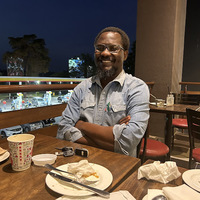






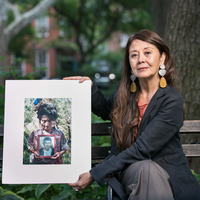



Uploads
Papers by Dr. Francis Onditi